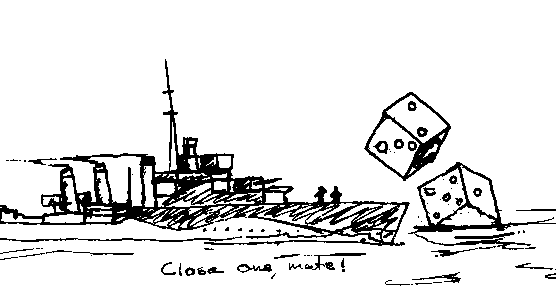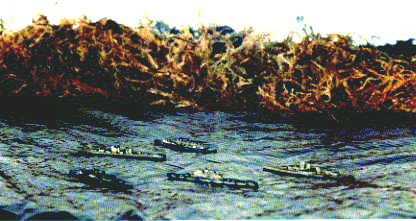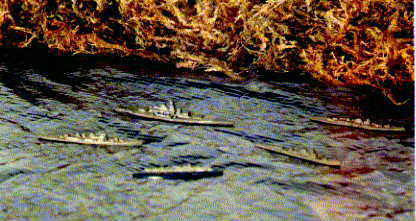Small Navies


I promise to re-do this one soon!
Many years ago I acquired a large number of ships in 1/4800 scale manufactured by a company called Leicester. As I recall, they were 35 cents apiece. The quality was spotty, some of them were very good (especially the French and some British) while others were rather poor (the Germans in particular). I did not buy many U.S. or Japanese ships; just some carriers and cruisers, a couple of destroyers and two battleships per side (the IJN Nagatos were an ok choice, although I would really like a pair of Kongo class instead; but the two New Mexico class ships for the U.S. are, in retrospect, a bizarre selection). Of course, these models no longer seem to be available. The only ships I find in this scale are C in C, and they make only German and British ships at the moment (and I wonder if they will be usable with the Leicester ships, C in C castings are usually very refined as opposed to the cruder Leicester pieces). If you have any 1/4800 scale U.S. or Japanese ships you would like to part with, please e-mail me!
**** I just learned through an e-mail from John Brzezinski that the former Leicester ships are available again! They are now offered by M.Y. Miniatures from England, http://geocities.datacellar.net/mickyarrowminiatures/fortyeight.html .
The part numbers are the same, but there has been a modest expansion of the range to include (among others) the more common U.S. battleships such as South Dakota, Washington and Iowa classes. Great news!
I recently dug out my collection for a game or two; then started doing research on the Internet. It is amazing how much more information is readily available! Ship data, lists of ship names by class, descriptions of engagements, ship drawings and photographs are much more available now; 15 years ago I did not have the money or level of interest to buy or search out the books that would have been required to collect all this information.
The only ships currently available in 1/4800 scale are from C in C Miniatures. All are for North Atlantic service. The list is as follows.
MF-4801 (GERMANY) 1 Scharnhorst, 1 Prinz Eugen, 1 Graf Spee, 1 Koln, 2 Narvik, 3 Maass (9 total)
MF-4802 (UNITED KINGDOM) 1 Duke of York, 1 Suffolk, 1 Southampton, 1 Jamaica, 2 Ajax, 2 M class, 2 O class, 2 P class (12 total)
MF-4803 (GERMANY) 1 Bismarck, 1 Scharnhorst, 1 Prinz Eugen, 1 Graf Spee, 1 Koln, 1 Z23, 1 Z24, 2 Theodor Reidel (11 total)
MF-4804 (UNITED KINGDOM) 1 Hood, 1 Renown, 1 Repulse, 1 Dido, 1 Aurora, 2 Tribal, 2 J class, 2 M class (11 total)
MF-4805 (UNITED KINGDOM) 1 King George V, 1 Rodney, 1 Norfolk, 1 Town class, 1 Aurora, 2 Tribal, 2 J class, 2 M class (11 total)
MF-4806 (UNITED KINGDOM) 1 Ramilles, 1 Revenge, 1 Suffolk, 1 Edinburgh, 1 Colony, 2 Tribal, 2 J class, 2 M class (11 total)
MF-4807 (ALLIES) 3 Liberty Ships, 3 T2 Tanker, 3 Doxford Freighter, 3 Tramp Steamer (12 total)
See my Links section for some sources.
I grew up thinking almost all naval ships in WWII were basically gray Ė they sure looked that way in black and white photos. All the more modern ships and preserved WWII ships I saw were painted that way and even the color illustrations I saw in general history books and model box art normally showed ships painted monotone gray (not to mention the term "battleship gray" for a dark, dull gray color). Yes, I knew about the German black and white dazzle schemes on the Bismarck and Prinz Eugen, but I assumed those were exceptions. What a surprise to learn that dazzle schemes were en-vogue during the war, and employed by most navies. The U.S.N. used purple/blue and multi-tone gray "measures", the British schemes used blues, greens and near-white in some truly wild patterns. So my neatly painted ships in plain grays with tan decks are mostly wrong! Only the Japanese seem to have preferred plain gray. Sources of painting information on-line include artists renditions, photographs of the actual ships in service (usually b + w) or preserved and model photos. The authenticity of the models, preserved ships and artist renderings is limited by the research and accuracy of the individuals doing the work. In-service photos are limited by the userís ability to interpret color from black and white pictures. Since these are wargaming pieces, I wonít lose too much sleep over the issue.
 |
 |
| U.S. ships (New Mexico, Baltimore, Cleveland, Fletcher and Yarnnal) in 1/4800 scale from Leicester. | IJN Ships (Yamato, Mogami, Myoko, Aoba and Ushio) in 1/4800 scale from Leicester |
This is a fictional scenario in which the French try to escort the unfinished battleship Richealeau from Dakar back to Toulon. The British send part of Force H to intercept. In early July, 1940 British naval units crippled French naval strength at Mers el Kebir. The attack by Fairey Swordfish on the incomplete battleship Richeleiu in Dakar failed. The Vichy government has ordered the ship to return to Toulon, and sent an escort to accompany the ship to France. This force is intercepted by elements of Force H from Gibraltar.
This scenario was played with 1/4800 ships and General Quarters rules. Gunnery
ranges were halved to match the movement scale and allow the game to be played
on the six foot by four foot table available. The French player used the
Strasbourg to delay the British, sacraficing her and the cruiser La
Galissanniere. The British lead with their destroyers, which were crippled
or sunk without damage tot the French. The cruiser Gloucester was torpedoed
and sunk by French cruisers. the remaining French ships escaped. The game
was judged a draw.
Possibly the most famous WWII naval engagement; the Prince of Wales (KGV class) and the Hood intercept the new battleship Bismarck and the heavy cruiser Prinz Eugen. Unless the German is very lucky, the scenario will favor the British player with two heavy units vs. the Germanís one. I would re-rate the Hoodís armor as BC (she was a battle cruiser and had known deficiencies, especially in deck armor). Also, the Prince of Wales was a new ship, experiencing teething troubles with her main armament (and probably an inexperienced crew) so I would block one turret from firing anytime she rolls sixes on two out of three dice while firing (for one die 6 turns) AND give her a +1 on straddle rolls.
Possible variations include joining one or both Scharnhorst class battleships
or the Scheer/Lutzow heavy cruisers on the German side (as was planned, but
these ships were damaged by the RAF). The British could reinforce with the
CAs Norfolk and Suffolk, which had been shadowing the Germans but were ordered
to stay out of the fight.
This scenario covers the death of the Bismarck at the hands of Rodney
and King George V (with Renown, Sheffield and Ark Royal waiting in the wings).
Historically, Bismarck started the fight with one or two hull boxes and the
bridge/rudder box already marked off and low on ammo; but this just makes
the whole scenario even more unbalanced. Of course, you could assume that
Prinz Eugen stayed with the Bismarck, but that will not help much. Again,
Scharnhorst could be assumed to have accompanied Bismarck.
The first of a series of (mostly disastrous) night engagements between the
Japanese navy and the U.S./RAN forces around Guadalcanal. Admiral Mikawa
with a scratch force of five CAs, two CLs and one destroyer attacked the
Allied forces around Savo Island. The Allied forces, exhausted by two days
on alert, were divided into five groups. The two destroyers on picket duty,
U.S.S. Blue and USS Ralph Talbot, failed utterly to detect the passing Japanese
ships. A Southern group consisted of two destroyers (Patterson and Bagley)
and two Cruisers (U.S.S. Chicago and HMAS Canberra). This groupís commander;
Admiral Crutchley, RAN; was away with his flagship HMAS Australia and had
not designated a new commander. The Patterson radioed a warning, but Japanese
torpedos were already in the water. Canberra was soon sinking, struck by
Japanese Long Lance torpedos (and possibly also by badly aimed tropedos fired
by the U.S. destroyers) and ripped by gunnfire from the IJN cruisers.* Chicago
took a torpedo hit in the bow and raced away in confusion. The Northern group
contained three heavy cruisers (Vincennes, Astoria and Quincy) and the destroyers
Helm and Wilson. Despite hearing the gunfire to the south, this group was
also caught un-aware and torn apart by gunfire and torpedos. All three crusiers
were sunk, managing only a few hits on Chokai and Aoba in return. Admiral
Mikawa now decided that it was too late to procede further into the Sound
in search of the transports, so the Japanese forces turned around and sailed
away, engaging and damaging the other picket destroyer (Ralph Talbot) on
the way. Other groups guarding the Eastern entrance to the sound and with
the transports were not engaged.
* After publishing this page I received the following note via email from Mackenzie Gregory of Australia: "I note on your Small Navies Site under The Battle of Savo Island you indicate that Canberra was hit by Long Lance Torpedoes. At the start of Savo I was the Officer of the Watch on Canberra's bridge as a Sub Lieutenanmt RAN, I can assure you we were not hit by a single Japanese torpedo, we probably picked up a torpedo which came from our starboard US destroyer escort USS Bagley. Should you be interested I have published my story about Canberra's loss on my Web Site, its URL is http://ahoy.tk-jk.net/". And an excellent set of articles they are!
Thank you Mr. Gregory.
Pieter Roos
The last daylight gun battle in WWII without airpower involved (although the Japanese did deploy one or two spotter aircraft from their cruisers). This is still a tough scenario to game, since the U.S. is outnumber two to one in both light and heavy cruisers. Most gamers will bull right in, especially as the Japanese, closing to effective range or even close range and blasting away. The actual forces were rather circumspect, with the Japanese cruisers mostly content to fire at long range and keep their distance. The Japanese destroyers stayed out of the action altogether, suggesting they were being used as transports rather than combat ships. My suggestion for starters would be to use the normal victory conditions, but subtract 2pt.s for each box checked off on your own ships.
What to do if you have a better selection of British and French ships than U.S.? Make up a scenario to use them against the Japanese! The British did participate in the Pacific late in WWII (where the armored carrier decks on the Illustrious class carriers proved valuable against kamikaze attack), and there was the Prince of Wales/Repulse incident three days after Pearl Harbor, but nothing really satisfactory for a good game. What if the British and French got involved with the Japanese earlier, say as the result of the "accidental" bombing of western ships during Japanís Shanghai operations around 1937? Let us suppose an Allied squadron of a carrier or two (Ark Royal and either a Furious class or maybe Hermes) with a fast battleship/battlecruiser escort. For argument, assume the British flagship is HMS Nelson with HMS Renown and HMS Repulse forming the battlecruiser element (although it could just as well be Hood). Add a couple of heavy cruisers (Kent, Suffolk, Exeter) and CLs (Ajax and Orion), a few DDs for ASW work, and a French division of the Strasbourg and attendant cruisers (maybe add the Bearn?). Remember that the KGV and Richealeau classes are not available at this time. Iím assuming the older British and French ships such as the Queen Elizabeth class, the Royal Oak, etc.; and the Provence or Corbet are too slow to send with the others. The Japanese can have Akagi, Kaga and any of the Nagato/Kongo/Fuso/Ise class capitol ships (letís say Nagato, Kirishima and Fuso for variety) together with escorts (2 Mogami heavy cruisers, the CL Aoba and a couple of DDs). The Yamato is too late for this match up, as are many of the carriers. This should make an interesting mini-campaign (for the carrier operations) or set of surface scenarios. Remember that coordination between the British and French divisions should be difficult!
A set of rules for control and reaction of naval forces. Intended for General
Quarters 1, but usable with almost any rules.
A shorter, catchier name is C3Sea.
David Manley's site including Pre-Dreadnought GQ and play aids.
Club site with description of the General Quarters rules:
Personal page about WWI naval gaming, includes a comparison of 1/2400 scale and 1/6000 scale miniatures
A commercial site with stats for a wide variety of ships for use with GQII
A magazine on naval matters (wargaming and history). the online samples include some options for General Quarters.
Info on everything to do with the IJN and the Pacific war. (The name means "Japanese Navy" in Japanese).
United States Naval & Shipbuilding Museum Online
Good source for U.S. Navy info and links.
Major Ships of the German Kriegsmarine
Self explanatory
An on-line source for small-scale ship miniatures.
Ditto
You are guest # |
|
This page hosted by
|